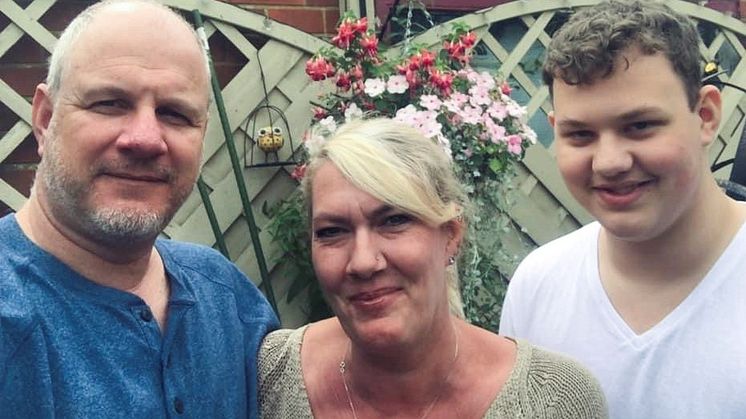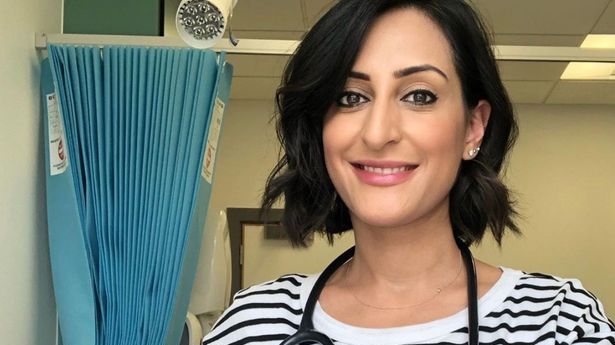
Press release -
Surrey stroke survivor urges people to check for ‘silent condition’ which can cause serious strokes
A stroke survivor from Hersham is backing a charity’s plea for people to carry out a simple test on themselves in case they have a ‘silent condition’ which could cause a serious stroke.
Michelle O’Connell’s stroke was caused by atrial fibrillation or ‘AF’, where the heart beats with an irregular rhythm. When this happens, the heart won’t empty all of the blood out of its chambers with every beat and the leftover blood can form clots which travel to the brain, blocking off blood flow and causing a stroke.
The Stroke Association is urging people to mark Stroke Prevention Day on Thursday, 12 January, by checking their own pulse to make sure it’s not irregular.
Michelle, a 51-year-old accounting supervisor, was at home with her husband Patrick and son
Morgan when she had the stroke in June 2021. Fortunately, Michelle had previously been diagnosed with AF and knew it could cause a stroke so she had made sure both of them knew to watch out for the FAST signs of someone having a stroke – Face, Arms, Speech, Time.
“I was watching TV when the stroke happened,” said Michelle. “My left had went a bit shaky then within minutes I lost all feeling in my left side. I was alone, tried to use phone but it didn’t recognize my face. I didn’t know what to do so intentionally fell onto my left side on sofa. Thankfully, my son came downstairs so I called him to get my husband. He knew straight away what had happened and rang 999.”
Michelle was rushed to St Peter’s Hospital in Chertsey, then transferred to St George’s Hospital, where she had a thrombectomy, a medical procedure where the large clot blocking a blood vessel is plucked out.
Michelle was active and healthy but had been having occasional bouts of a high pulse rate hitting more than 180 beats per minute and irregular heartbeat since her early to mid-40s. Initially, she didn’t go to her GP because she “didn’t want to sound silly”.
In 2017 she plucked up courage to consult her doctor and was referred to a cardiologist who diagnosed her AF.
“I was put on a couple of meds but over the next two years never really felt it was being well controlled, episodes actually increased to start with. I wasn’t given blood thinners as I was deemed too young and otherwise healthy/low risk.”
Michelle’s medication has now been changed and she has been put on anti-coagulants to lessen the risk of clots forming in her blood in future.
Her stroke has left her with weakness in her left arm and leg, anxiety, fatigue and speech problems when she’s tired.
“For the first few months I would wake in the night and lift my left leg and arm to check they still worked!
“I was put on an anti-depressant which has definitely helped my day to day well-being. I am still over emotional and cry when I see people or things on TV. My left side works fine but it gets ‘lazy’ when I am tired, and my left hand is definitely weaker.
“I still have some tiredness and have lost focus. It’s easier for me to deal with one thing at a time. Sadly, I can’t do as much of my beloved gardening but hopefully with more time I will regain even more energy.”
Michelle believes everyone should check their pulse and contact their GP practice if it seems irregular.
“It’s really important to get the message across. Don’t be embarrassed. Don’t think you’re being silly. It may be something that’s really serious.
“You can get help to control it. It’s a frustration that I wasn’t put on blood thinners straight away but my risk factors were low. I was unfortunate.”
Doctors have been unable to say what caused Michelle’s AF.
“I had an ECG and they said my heart was that of a 20-year-old. Everything else was healthy and there was no underlying cause. Why me? I don’t know.
“But I think life is a lot tougher and a lot busier these days and you don’t have time to relax. The stresses can mess up your body.”
It is estimated that around half a million people in the UK are living with undiagnosed AF. It is linked to around one in five strokes and strokes in people with AF are more severe and are more likely to result in death or serious disability.
A survey by the Stroke Association to mark Stroke Prevention Day on Thursday 12 January revealed that almost three in four people (69%) in the South East did not know that AF is a major cause of stroke.
The charity has a video guide on its website at www.stroke.org.uk/spd23 showing people how they can check their own pulse on their wrist or neck.
Nick O’Donohue, the Stroke Association’s associate director for the South East, said: “It's worrying that so few people know that a little thing like how your heart beats can lead to a massive stroke.
“AF often has no symptoms and a stroke can strike without warning. Don’t let the first sign of your AF be a sudden and life-changing stroke. With early diagnosis and effective management of AF, your risk of a stroke dramatically decreases so it’s vital to get checked regularly.
“It’s really easy to check your own pulse and our research told us that most people are able to. Feel for your pulse on your wrist or neck to make sure it has a regular beat. If you suspect you have an irregular pulse, contact your GP Practice.”
Topics
Categories
- Stroke strikes every five minutes in the UK and it changes lives in an instant.
- The Stroke Association is a charity working across the UK to support people to rebuild their lives after stroke. We believe that everyone deserves to live the best life they can after stroke. From local support services and groups, to online information and support, anyone affected by stroke can visit stroke.org.uk or call our dedicated Stroke Helpline on 0303 3033 100 to find out about support available locally.
- Our specialist support, research and campaigning are only possible with the courage and determination of the stroke community and the generosity of our supporters. With more donations and support, we can help rebuild even more lives.
- You can follow us on Twitter, Facebook and Instagram.













